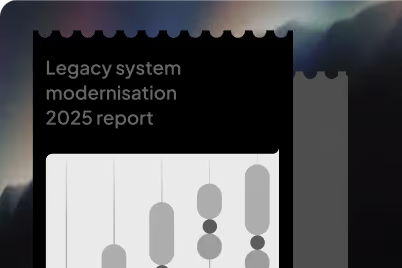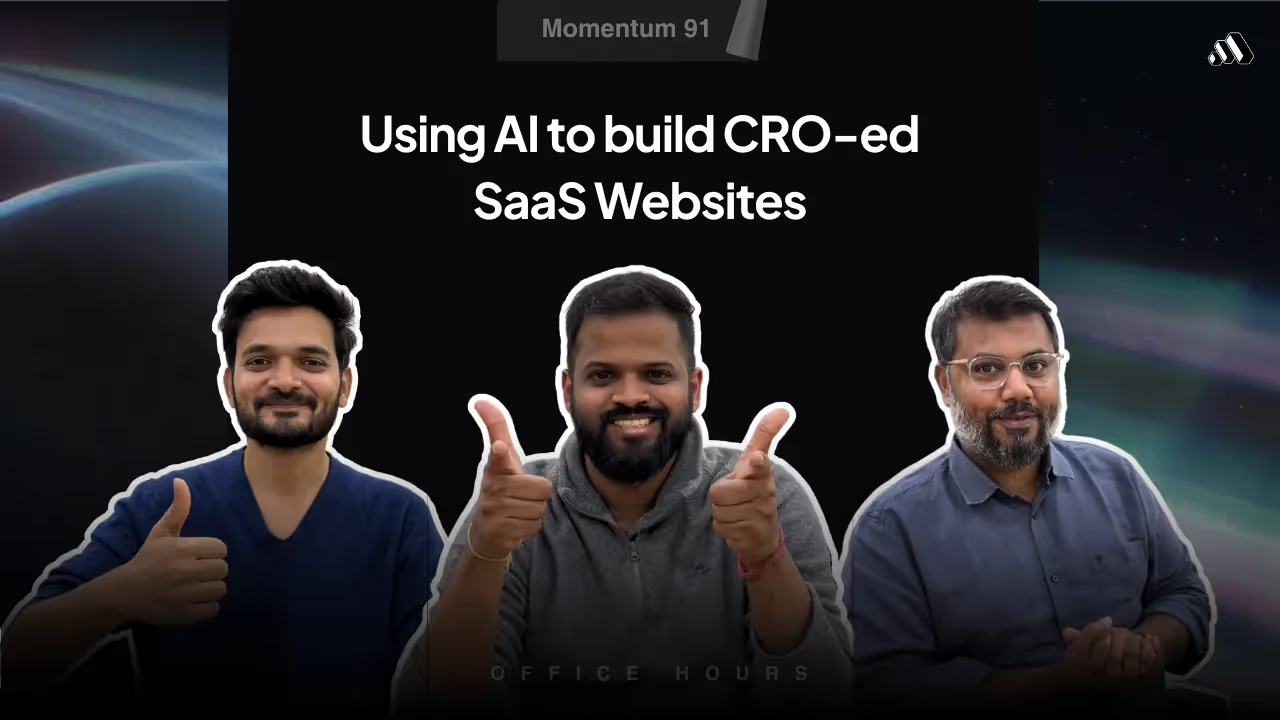Using AI in Sales for SaaS firms

Introduction
In this conversation, the co-founders of Momentum Office hours discuss the integration of AI in software sales, exploring its impact on various sales processes, personalization, forecasting, lead generation, and account management. They emphasize the importance of human interaction in sales while highlighting the efficiency AI brings to repetitive tasks and data analysis. The discussion also covers various tools and strategies that can enhance sales effectiveness and customer relationships.
Key Takeaways
- AI can be integrated into every aspect of the sales process.
- Personalization in sales should feel genuine and relatable.
- AI helps in reducing time spent on repetitive tasks.
- Sales forecasting can be improved with historical data analysis.
- Lead scoring can be enhanced through AI insights.
- Tools like Conversica have shown significant revenue improvements.
- AI can assist in analyzing market trends and competitor data.
- Sales meetings can be optimized with AI-driven insights.
- Follow-up processes can be automated and personalized using AI.
- There is a gap in the market for AI tools focused on account management.
Transcript
Yash Shah (00:00.382)
like that, but I hope, but it streaming to Jay's profile. Done. So, I think we are live and in hopes that we are, we will start today's session. And so, hello and welcome to Momentum Office hours. My name is Yash and I joined by my co-founders Harsh, Jay and Koushik to discuss topic of the week.
which is using AI in software sales. Our goal is to provide you with actionable insights and practical strategies that you can apply for your own products. Throughout the session, we encourage you to engage with us by asking questions, sharing your thoughts. This is a fantastic opportunity to learn from each other and give you insights that can help drive your software or SaaS initiatives forward. So let's get started. Jay, Harsh, Koushik, how are we doing today? Doing awesome. Yes. Doing awesome.
lot of questions around using AI for selling software. Who wants to go first? Yeah, can go first. let's consider there is some traditional sales process, right? And if we are using AI sales process, there is one AI sales process, right?
So if I want to implement integrate AI in my sales process, right? So what do you think? Where are some points that we can in this particular point on this way if I implement AI in my software sales process, right? And that can boost my sales. So what do you think? There are any, we can say the points that in the process, there are five points where you can add this. Well,
Just before you begin, sorry. Harsh's question, this question is all questions. Exactly. So all questions put together everything. So just tell us everything. This is the whole episode. please, go ahead. Yeah, mean, basically indeed, so a very short answer to this, since Harsh asked that where can we implement AI, short answer to this is everywhere. But I'll definitely answer
Yash Shah (02:23.136)
in little deeper to tell the processes. it's not like there's a sales product and now since you know the because of you know increasing boom in AI you are introducing one more product or one more feature which is of AI and so that particular part will increase some amount of revenue inside the you know overall revenue and everything or market capture. It's not like that when you're talking about utilizing AI for sales it is being implemented from everywhere.
consider list building the initial step, the accounts that we are going to target for from building those lists to having the sales calls and even all the activities that are after the sales calls that optimize it. AI is being used everywhere. So I will go step by step and try to answer it and keep it in a way so that we have other questions also which could add up to the answers what I've given already. So let's consider it this way.
As we discussed in previous earlier session for SAAS especially, it starts from awareness, then consideration, then purchase, then retention and advocacy. So in all the different stages, it's ultimately people who are dealing with your either website or the product. In these cases, earlier days what happened was that you just have a list. If you talk about the sales, you just were reaching out to these people.
spending lots of times and again, like trying to, you know, have some personalized answer. So without AI, let's say, if you are doing the traditional way, what happens is you spend a lot of time in building the list. Again, further more time is getting utilized in qualification of the same and then again, time in, you know, polishing. So the journey of from user to customer is elongated and the efforts from marketing and sales standpoint is also high.
What AI actually does is making these processes easier. So as we go further in answering all these questions that you might ask, we'll go through each and every process in each and every stage on how AI can be used. also, we can discuss on what tools can be there that can be utilized for making things easier. To help you with one of the answers, so there's one very interesting tool. I'm trying to recall the name. I guess it's.
Yash Shah (04:49.486)
It's conversing up. it's basically, see what we think of AI in sales ultimately at times is that it's just utilized in a bot or it's just giving you some transcripts of your call and you know, just you can change the languages or something like that, but it's not like that. So even if it is inside the conversations happen with the users or as well as the customers in different aspects. And the goal for us is to make sure that
you know, whatever stage a particular lead is at, we want to move that to a next level. So I'll give you an example. Let's say you are a very first time user of a SaaS product. You are coming to the platform and you have certain questions. Now, if the bot in itself is just able to give you the answers based on some documentation, this in that documentation, it might be a case where the bot is supposed to make the call getting booked directly. But in this case, if someone is asking a basic question and if bot directly
tells about getting the call book that would not help. So these intelligent systems work based on three different things, especially in this particular case where an actual AI is being used, not just a simple bot. We know to answer during the chat is that it uses three things. One is the open LLMs which are available. Second is brand-based LLM in which some more element of
the brand in itself is inculcated and the third one would be all the information available from data sources which are already there. So based on that what happens is now the AI that is answering the person who has raised the query is supposed to do multiple things. First is to move this particular lead from one stage to another. So second is to answer the question which was there and third thing is to make to understand and qualify whether this particular lead will fall into a criteria.
So in this case, considering all of these three things, after understanding that okay, the lead is in this state based on the question, it will try to answer. So ultimately, does automation, but in a faster way. I can go on and on, but I would like to polish it with further answers that you asked. So I sort of have an existential question with this, right? And which is to the effect of almost every session that I have.
Yash Shah (07:16.142)
seen regarding using AI for sales, talks about personalization and cold emails, talks about chatbots answering questions, talks about enrichment in terms of data for the lead or the prospect and things like that. And all of those things, I firmly believe have been taught from the standpoint of the organization that is selling. What are the pieces that are currently happening which can be made more efficient?
with AI. That's how we've always thought of AI and sort of implemented it across the sales cycle or the purchase cycle. But as a customer, do I want to be sold with AI? Is there like, what's the like, don't, so as an example, like I would enjoy talking to a person instead of like knowing that doesn't even matter how hard you try to personalize your emails.
As a prospector, as a customer, I will always have that doubt in my head that you've done this using AI, you've not spent enough time to actually look through my profile or what do I do and so on and so forth. do you, like where do you stand on it? Are you firm believer that, hey, know, AI should go ahead, we should use AI in sales for efficiency, for bigger funnels, for higher conversion rates? Or do you believe that, you know, there is a space for companies that will take a stand
saying that we will not use AI as a part of our sales process, at least not part of the sales process that is customer facing. We will always make sure that there are, because I know for a fact that there are organizations like Basecamp and Hey, and they say, you know, always people never bot, you know, they never talk about, so like, do you believe that there is space for that sort of selling as well? I mean,
In these cases, I completely agree that the final touch point with customers should be human. obviously, for it to be actually personalized, it has to be human. But there is a fine line in this. So what happens is why, first of all, there is a need of AI in sales is to reduce the time that is being done on a repetitive task. Or we can say to reduce the time
Yash Shah (09:41.774)
So let's say earlier what happened was all the manual work used to take a lot of time, 70 % of time, and only 30 % of time. Seems people were able to go into the actual meetings because otherwise they are just researching and thinking on what to type or what to email or what to converge upon. Now, utilizing AI for that research is good when it comes to talking. At a certain stage, it's OK if AI chat, is it? But then in the end, there's a human intervention which is needed.
Ultimately, especially talking about larger ticket sales, if human interaction is there, it is great. But there is still always a debate that AI would help to give you good amount of data, which manual intervention and manual efforts would not do. So we can utilize it well. And as far as writing the personalized message using AI goes,
I just recalled one small thing I had used in AI tool for reaching out to one prospect. And that person told me that he was in doubt that this is so personalized that did you actually use AI or was it you? So that's the art of utilizing prompts. So that's where that is a journey which we all should follow. And if that is utilized well, then I believe there is no problem with using AI given in customer facing.
So Jay, so one thing that I wanted to understand is that how does AI forecasting help with sales outrage and all those things, and as well as even to analyze the existing prospect behavior and how does an entire field work? So because there's an aspect of AI which is very good at forecasting. is there any tool that is currently doing that or how do you see your work?
Right. So, so when it comes to forecasting, it's all about understanding the past data that is the historical data, which let's say we're talking about the CRM, you have a CRM system and predicting certain things would require certain skill set based on certain data points, right? So you have a historical database that, okay, let's say you have 100 leads in your first stage from that always most probably like 60 % of those leads goes to the stage two.
Yash Shah (12:08.278)
And then from there itself, from the initial 160 venture and then from there, let's say 40 % goes ahead and likewise. Same with, let's go a little even deeper. Let's say in this 60, 40 and 30 ratio, there are certain profiles having some similarities that they had the annual run rate of this much amount or they had a data transfer, they use this particular feature or any of these data points which are there.
If we go on manually understanding these data sets, it would be difficult for having an actual understanding or getting the right intelligence of future forecasting. So there is a very good tool called Clary, which is utilized for revops, especially for forecasting. So what it typically does is understand all the historical data points, all the stages, as well as all the interactions with the customer as well. Because those things are also important, what sort of keywords were used.
So ultimately it tries to understand each and every data set and then it implements the same and gives you the forecast. So this was one and apart from this, you could also see in lots of CRMs, are seeing that, you we are giving now lead scoring based on intelligence and all the other aspects. So this is again coming to the earlier point we discussed that. So earlier only lead scoring. So there's a thing called lead scoring, right? In CRM, basically,
what your interactions you have with particular lead and how the lead is responding, it will increase the lead score. So let's say for particular CRM, it's based on 100. So just to give you an example, let's say that particular lead is subscribed to your newsletter. So if they're opening a particular email, that is also giving you a lead score of, adding a lead score of two, giving you interaction is like response to your message or email is like adding plus five and likewise. So those were just basic activities.
which are being logged together to give you a cumulative idea on what is the good probability of this lead getting closed. add that on top of this, just add like their insights in social media, which are also integrated to your own CRM, their insights on different other through different other platforms. And, you know, NLM is being capable of getting further more data sets which were not available otherwise. So having all of those information stick together.
Yash Shah (14:35.49)
this would give me a new form of lead scoring, which is more efficient and not just based on the very basic activities which are there. So that's where this would also help in forecasting. So that's why I to mention the same as well. So Salesforce is utilizing Einstein for the same, even Freshworks is utilizing Freddie AI for the same. So if you check in Freshworks, it will give you that why it is scoring this much amount.
The datasets are very amazing. I mean, you would not be able to find it other way.
Okay, yeah, so, so, like the in AI, right, there are different strategies that we can use like, like the there is a we can say the personalized marketing for a particular customer, right? Otherwise, we can use predictive of a prediction of a customer, right? How they want to think about the product, right? So, if we like the lead generation, take the lead generation phase of growth sales purchase, right?
So what do you think? What are the strategies that are the best with that we can implement in lead generation to increase the score of the lead? To increase the lead. So, okay, I'll try to answer it even broader, right? Using AI is having lots of use cases and the more you read and know about it, it gives you more and more excitement. So to give you three basic sections, how it would be helpful and then to answer your case, I'll try to put it.
up. The very first thing would be improving your decision, so giving you the intelligence. that was one. Second one was to automate the repetitive tasks. And the third one is basically enhancing the personalization. So when it comes to sales, enhancing personalizations are all about you are reaching out to someone, it should not feel seizing, it should be relatable, it should give you the direct answer, and it should not be too long.
Yash Shah (16:38.188)
these kind of things. if you want to enhance personalization in Setsas, there are two ways to it. It's a direct way where you are just doing, you you're just shooting the emails to particular users who are performing particular activity inside. So that could be one. And the other one would be simply by implementing the same messaging inside the platform. So for example, let's say,
I'll give you an example of ClientJoy itself. Earlier, we started with having our own AI element inside writing the emails. At that time, writing emails through AI was something which people used to do only on Chatjibbity or Gemini. The tools were yet to come. And at that time, we had launched that particular feature. So at that time, let's say people were utilizing, were clicking on mailbox or were just writing their first email in that particular time.
having that personalization on just showcasing a very small part where, you know, how they could save their time utilizing the AI element. That could be helpful. Now, adding on top of this, let's say this particular user is from Germany and now your AI part is also giving seven different output in seven different languages in which Germany is also there. So you to personalize this, that message should also say that this also includes German language, but for other people it should not.
So these kind of use cases can be utilized in set product for personalization and making sure that they are using the all new features which are increasing their efficiency.
Can you, like from a software sales standpoint, can you share a couple of examples of how other companies have implemented, like you've known of those cases where other companies have implemented AI as a part of their sales process? So, I mean, there are a lot of companies for sure, but I don't have the exact name of companies, however. That's okay.
Yash Shah (18:47.328)
for a fact that there are tools what impact they have done. So for instance, Converzika is for end-to-end sales. So we can call it when a customer enters the cycle and from there, them being the advocate, all the steps which are supposed to be done by them, Converzika tool would help you do that. Utilizing that, it has improved 20 % revenue of the company.
overall report from the company states that it has helped for improving 20 % as well. I don't have an exact case study. I can share. mean, I don't have it something which I know for a fact. I'm not able to recall the name, but yes. I mean, I can share cases from case to case. can go and that would give the answer for sure. Sure. Got it. So Jay, are there any tools
currently, which would help us to analyze the market trends or to understand the competitive data in any of them.
tools to understand market trends as well as the competitor data like same competitor what sort of data they
Yash Shah (20:05.358)
workflow or their following or whatever they're doing. Is there any AI that could help us, help me to do this? So if any tool would give that, it would be against, know, let's say we are utilizing one workflow and if our workflow, let's say we are using Freshworks and we are having certain workflows. Now if Freshworks is going to give that information to public, there will be a challenge, right? So there are no such tools where you can know what other people are doing exactly unless they have that set up ready. But
Again, coming to this, there are certain workflows which tools definitely do and also AI can be utilized for making these workflows better. So that is possible for sure.
Yash Shah (20:53.678)
Harsh, you are saying something? Harsh, you are on mute. Yeah, go ahead. No problem. Perfect. The other thing I wanted to discuss was utilizing AI for sales meetings. So one thing you mentioned, Yash, earlier that not having AI component, especially face to face is good, but it can still be utilized on coaching. Often it happens in the organizations that
everyone is focused on closing or reviewing, they are not able to, I mean, I have heard from lots of sales reps that they are not either getting the right training or right feedback at times. And even the sales managers are not having that time on, know, giving the right feedback at times because they are themselves engaged in closing or making some strategies even better. So in these cases, there are certain tools like this one.
platform called gong.io, is basically used for, so what it does is ultimately definitely does the basic thing like transcriptions, giving you all the insights from the meeting, meeting notes, action items. And apart from all the other things it gives you based on the data set that it has based on the multiple meetings that you recorded, it gives you on how much you have improvised, what you could have done in this particular meeting and those kinds of insights. It's just like you can consider it as a sales watch and
It gives you overall, you know, reality check so that, you know, from the next meeting, you can do that better as
So, there are lots of tools and platforms for executing a strategy. So, if you already have a strategy that these are the, this is the pool of customers or prospects that you are going after, there are tools to personalize, there are tools that help you write emails, that help you figure out script for code calling. So, there are a lot of tools and platforms that are AI enabled or in some cases even AI native to execute a strategy.
Yash Shah (22:57.72)
Do we know of any tools or platform that help us retune or refine the strategy itself? So in sales, you typically have strategy, tactics and tools, right? So like, is there anything that can help us figure out a better strategy or tell us what's wrong with the current strategy? Anything that can come to your mind?
any tools that can optimize the overall sales process, maybe not directly, but that there's a tool which gives you the hints for sure. So for instance, we know about clay, right? So be it, let's say you have a data or you don't even have a data. So certain companies already tend to have dedicated source for the data set, but then there is no option of optimizing it. I'll come to the answer, but there is some other piece that I would like to
put forward. So let's say there's a data set which is available. From that data set, want to make sure that you don't know what factor should be there to make sure that the conversions can be better if I'm doing the outreach on that particular data. So for that, let's say you're utilizing CLEAR. that, you're utilizing that it's EI enrichment. In that in itself, you could see a lot of options which it has, which very
few or almost no other tool has. So it helps you with that. So for instance, let's say you're putting some data based on some data that you found and from there you're utilizing crunch base to make sure that, okay, this company is having this amount of revenue. So those things are there, but apart from this, let's say you want to understand more detailed intent on, you know, whether the particular person had clicked on any topic related to this particular.
any social media post related to this particular topic or any of sorts. So it may not give you the direct idea on your outreach, but once you explore those options, new ideas can come for sure. So clay is something which one should experiment for sure, and it has great results. Correct. Jay, with respect to the one thing that I remember you talking about.
Yash Shah (25:13.762)
I thought if something is up, there is a tool that could help with respect to the follow up process. How could AI help with that such that no potential lead could slip away? Yeah, and so just to add to that, because follow ups are extremely boring to receive as well. So please, if you can share a little more on that.
Right. a tool I mentioned called Converse Eka, right? It does not, I'm going through examples, so that would be more relevant. So that particular tool does not only take care about the closing part, but once the closure is done, the next steps which are important is to make sure that at least certain amount of features are being utilized. Let's say activation happens for that particular tool. Apart from that, that particular person is also being an advocate where
Maybe they are sharing the reviews. Maybe they are referring to someone else. These kind of activities are being done from there. And follow-ups as well. So for instance, let's the closure did not happen. Let's say trial period is over, and now that particular person is not there. So you can set up certain systems. You can train AI in which, let's say, if this particular pattern is being followed, let's say 40-day trial is there, and after nine days, the person is losing out.
It means that he or she may not have utilized this particular factor. so that amount of reminder goes up to 13 days. So it will again go through obviously an email or any automated call where obviously a recorded call is there. And then they are trying to understand that what happened is just like an IVR call. But it's all about making sure that people who have lost
are again coming back and they're having the right touch point. Now, especially in SaaS when we are talking about thousands of users, it's never enough to, there will never be enough number of people who are going to follow up with each and every cases, You can definitely set a drip campaign for people who are also losing out interest, but still you cannot go that personal. But with AI, you will be able to do that personalized part as well and utilize this set of followups even effectively. yeah, Converse Zika would be able to help you.
Yash Shah (27:41.006)
And the other piece that I also want to understand a little is around, so there is AI use cases in sales, but then there could also be AI use cases in account expansions or account management, which is once you have closed, then making sure that they renew, making sure that they purchase more. A lot of times what might happen is that and this is not
job of a salesperson, right? They bring in the first dollar, account expansion, you know, sort of takes that one dollar, makes it 10 or 100 or whatever it is. Any platforms from an account management standpoint, where account managers or key account managers are able to sort of build relationships, because that's something that I've not come across up until now, where existing customer relationships are managed in a better way in the software ecosystem.
Right. So the best answer to I mean, the best tool for this is yet to come. If you talk about end to end again, I would again vouch for the same that is Converzika but HubSpot surprisingly, actually not surprisingly has taken over a product called Clearbit and they are bringing with a new brand name called Breeze. So that product has three elements to it again with respect to
It has copilots, it has agents, and it has intelligence as well. But the agent part of it is something where you will be able to set up workflows, especially from account management and account expansion standpoint, where you can set up workflows where there are instances that you can set that, OK, if this instance is happening, you should pitch this particular part through either email or messaging, and likewise. Correct, yeah.
So we are yet to find out the right tool, the best tool. Maybe that's an opportunity. Maybe that's an opportunity for all the people who are watching or listening to this conversation. If, I there are no account management softwares that exist out there which will help organizations increase their sort of once we have landed an account, how do we expand that?
Yash Shah (30:00.622)
There's no platform over there. If you can build an AI native experience for enterprises who can land and then expand, that will be a great opportunity. But with that, we come to the end of this conversation. And thank you for everyone who's joined us for this conversation. And thank you for engaging with us. Hope this was fruitful and meaningful for you.
And we'll meet again next week. In the meantime, please follow, please subscribe, please comment, please engage. I have been asked to ask you to do that. If you do that, that will be great. That will be also helpful. my mistake while I was, since I was talking and managing the stream, I clicked on the incorrect caption, but they are, so I meant to say see you in the next streams.
Thank you again for staying tuned with us. Until next time. Bye. Thank you, everyone. Bye. Bye.
The inbox update you’ll never want to skip
A quick catch-up with ideas, wins, and tips worth stealing, straight to your inbox every week.
The easiest way to reach us.
Share your details and we’ll get back within 24 hours.
Office hours
A plethora of insights,all in one place
From strategy to execution. All the big ideas, practical guides & fresh perspectives that’ll help you scale with confidence
Ebooks
Comprehensive guides that break down the shifts in business and technology, Helping you lead with clarity.

Office Hours
Your direct line to our experts. Practical advice for scaling, right when you need it.

Reports
Data-backed perspectives on where industries are headed, giving you the foresight to make bolder moves.

Newsletter
A quick catch-up with ideas, wins, and tips worth stealing, straight to your inbox every week.
.avif)
Podcasts
Conversations where you get to know everything from the ones who know it best.
.avif)
Your Offshore Development Center, Done Right
Access top-tier global talent, enterprise infrastructure, and complete regulatory compliance through our proven model.
Start Now

.png)





